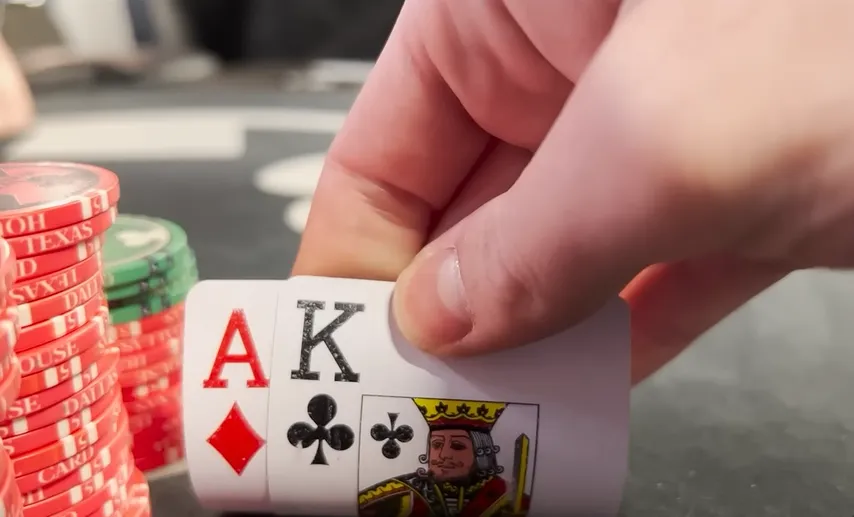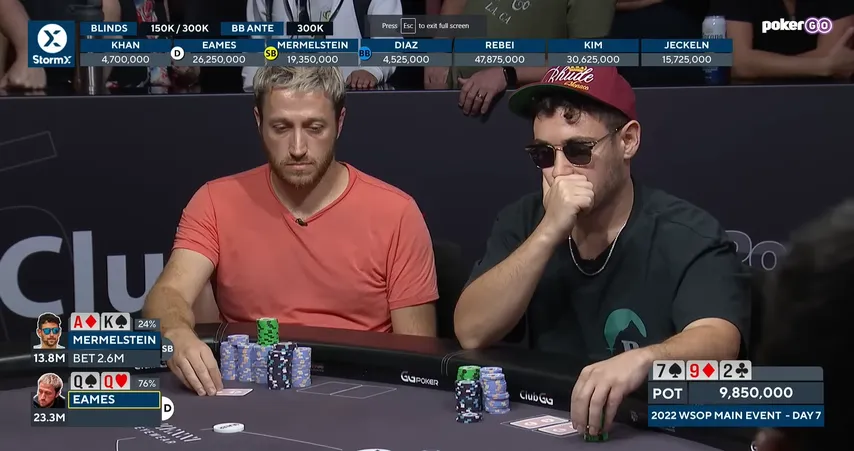Poker is a game of strategy, skill, and yes, a little luck. But even the best players can find themselves in tricky situations. One of those situations is when you're sitting there, with an Ace and King in your hand, and the flop gives you nothing. Nothing at all. You feel like a sailor lost at sea without a compass. What do you do? How to navigate these troubled waters?
Don't worry, we are here to help you. In this article, we'll explore 12 tips for playing after a failed flop. Whether you are an experienced poker player or want to start playing poker, these tips will help you improve your game and make more informed decisions at the poker table.
12 Rules for Playing Ace King after a Failed Flop
Navigating the choppy waters of poker can be confusing, especially when you find yourself with something like and a flop that doesn't help you.
But fear not, we have compiled for you the 12 commandments for playing after a failed flop. These strategic tips will help you make informed decisions, maximize your potential gains and minimize your losses. So, get ready to dive into the fascinating world of poker and improve your game with these valuable tips.

1. Don't panic, it's just a flop
- Understanding the value of AK
Even if you missed the flop, it's important to remember that you still have a strong hand with . Indeed, is one of the best starting hands in poker. This is a premium hand that has a high potential to become a winning hand, with around a 25% chance of hitting an or on the turn or river.
- Keep cool
It's natural to feel some disappointment when you don't hit the flop with , but it's crucial not to let that disappointment affect your play. Keep your cool and continue to play thoughtfully and strategically. Don't rush to fold just because you didn't hit the flop.
- Evaluate the chances
Even if you missed the flop, there are still two cards to come. This means you still have a chance of hitting an or a . Additionally, if you raised before the flop, there is a good chance that your is still the best hand, assuming that 2 out of 3 times your opponent won't hit anything on the flop either.
2. Assess the situation
- Analyze the flop
When you miss the flop with AK, the first thing to do is analyze the flop. What are the cards on the flop? Is there a possibility of a flush or a straight? What kind of hands might your opponents have? This information will help you evaluate your position in the game.
- Take into account the actions of your opponents
Your opponents' actions after the flop can give you clues about the strength of their hands. If an opponent bets big, he may have hit the flop. If everyone checks, it's possible they missed the board or have weak hands. Use this information to assess your position.
- Reassess your hand
After analyzing the flop and taking into account your opponents' actions, it's time to reevaluate your hand. Is your still a strong hand in this specific context? If the flop is low and off-suit, your could still be the best hand. If the flop is high and connected, you might be in trouble.

3. Play aggressively
- Keep putting the pressure on
is a strong hand, even if you missed the flop. If you have been the aggressor pre-flop, it is generally advisable to continue playing aggressively post-flop. This is called a continuation bet. This bet can often make your opponents fold, especially if they have weak hands.
- Adapt your aggression
It is important to note that aggression must be adapted to the situation. If you are facing a very tight opponent who has raised after the flop, a continuation bet might not be the best idea. Likewise, if the flop is very dangerous (for example, if there is a possibility of a flush or a straight), it might be better to play more cautiously.
- Use aggression to your advantage
Aggression can be a powerful tool in poker. It can put your opponents under pressure and force them to make difficult decisions. However, it is important not to be blindly aggressive. Your aggression should be based on an accurate assessment of the situation and the relative strength of your hand.
4. Know when to go to bed
- Assess the risk
It's important to remember that while is a strong starting hand, it is not unbeatable. If the flop is really bad for you and your opponent is showing strength, it might be best to fold. It's better to lose a small pot now than to hold on and lose a big pot later.
- Recognize the danger signs
There are certain signs that may indicate it's time to get away from your hand. If the flop has a potential flush or straight and your opponent bets big, he may have a very strong hand. If you are facing a very tight opponent who raises after the flop, it is likely that he has a strong hand.
- Accept defeat
It can be difficult to fold with , especially if you raised pre-flop. However, it is important to remember that poker is a game of patience and discipline. Sometimes the best decision is to minimize your losses and move on and focus on the next hand.
5. Learn from your mistakes
- Analyze your game
Every hand of poker is an opportunity to learn. If you played and missed the flop, think about what you could have done differently. Maybe you should have played more aggressively pre-flop. Maybe you should have folded after the flop?
- Take notes
It can be helpful to take notes while you play. Note situations where you have difficulty deciding what to do. Later, you can review these notes and think about what you could have done differently. This can help you avoid making the same mistakes in the future.
- Seek advice
If you're having trouble understanding what you should have done in a certain situation, don't hesitate to seek advice. There are many online poker forums where you can post hands and ask other players for advice. You can also read poker books or watch poker videos to improve your understanding of the game.
6. Use your position to your advantage
- Understand the importance of position
Position is a key element in poker. If you are in late position, you have the advantage of seeing what your opponents are doing before you have to make a decision. This can give you valuable information about their hand strength and help you decide the best action to take.
- Use position to apply pressure
If you are in late position and everyone has checked up to you, one bet could be enough to win the pot. Don't underestimate the power of position to put pressure on your opponents and force them to make tough decisions.
- Adapt your game to your position
Your position at the table should influence how you play your hand. If you are in early position, you should generally play more conservatively, because you have less information about what your opponents are doing. If you are in late position, you can afford to play more aggressively.
7. Bluff with caution
- Know when and against whom to bluff
A good bluff can win you the pot, even if you missed the flop. However, you have to know when and against whom to bluff. If your opponent is the type to call with anything, bluffing is probably not a good idea.
- Use bluffing as a tool, not a strategy
Bluffing is a tool you can use to try to win the pot when you think you don't have the best hand. However, it should not be your main strategy. If you bluff too often, your opponents will start to call you more often, making your bluffs less effective.
- Bluffing with a plan
When you decide to bluff, you need to have a plan. What will you do if your opponent calls your bet? What will you do if your opponent raises? By having a plan, you will be better prepared to deal with any possible situation.
8. Be aware of your image at the table (aka. table image)
- Understand how you are perceived
Your image at the table is how other players perceive you.
If you were very aggressive and showed some bluffs, your opponents might perceive you as a loose and aggressive player.
If you played very conservatively, your opponents might perceive you as a tight and passive player.
- Use your image to your advantage
Once you understand how you are perceived, you can use that image to your advantage. For example, if your opponents perceive you as a tight player, they will be more likely to fold to your raises, which can allow you to steal pots. Conversely, if your opponents perceive you as a loose player, they will be more likely to call you, which can allow you to win big pots when you have a strong hand.
- Adapt your game to your image
It is also important to adapt your game to your image. If you have been very aggressive and shown some bluffs, your opponents might start calling you more often. In this case, you may need to slow down a bit and play tighter. Likewise, if you have been playing very conservatively, you might be able to steal a few pots by playing more aggressively.
9. Remember that you can always hit the turn or the river
- Understanding Probability
Even if you missed the flop, you still have around a 25% chance of hitting an Ace or King on the turn or river. This means that in about a quarter of the cases you will be able to improve your hand and potentially win the pot.
- Don't get discouraged too quickly
It's important not to get discouraged too quickly when you miss the flop. Poker is a game of patience and long term. Even if things don't go as planned at first, there is always a chance that the situation will improve.
- Make decisions based on probabilities
When deciding whether to call, raise, or fold, you need to consider the odds. If you have a reasonable chance of hitting the turn or river and improving your hand, it may be wise to call, especially if the pot is large.
10. Learn to read your opponents
- Observe behaviors
If you can detect signs of weakness in your opponents, such as hesitation or changes in their behavior, these are called tells in poker, you might be able to take the pot with a bold bet. This is called “reading” your opponents.
- Understanding Gaming Trends
Each player has their own gaming tendencies. Some players are very aggressive, while others are more conservative. By understanding these tendencies, you can better predict what your opponents are likely to do and adjust your play accordingly.
- Use information to your advantage
Any information you can gather about your opponents is valuable. Use this information to make informed decisions and develop an effective strategy.
11. Don't hang on to your AK too much
- Avoiding emotional attachment to one hand
It's easy to get emotionally attached to a hand like AK. However, it is important to remember that poker is a game of rational decisions, not feelings. Don't let your attachment to one hand prevent you from making the most strategic decision. It is crucial to remain objective and not let your emotions take over. If the odds are not in your favor, it is best to fold and move on to the next hand.
- Don't overestimate
AK is a strong starting hand, but it is not unbeatable. It is important not to overestimate the strength of your hand just because it consists of an and a . If the flop doesn't help and your opponent is showing signs of strength, it might be best to fold. Remember, poker is a long game and it's important to know when it's time to lay down the cards and live to play another hand.
- Accept game variance
Poker is a game of luck as much as skill. Sometimes, even with the best starting hand, you won't win. It's important to accept this variance and not let it affect your game. Don't get too hung up on your if the flop doesn't help you. There will always be another hand to play.
12. Practice, practice, practice
- The importance of practice
As with any skill, the best way to improve at poker is to practice. The more you play with after a failed flop, the more comfortable you will become with this situation. Each game is an opportunity to learn and improve. Don't get discouraged if you make mistakes. Instead, use them as learning opportunities.
- Learn from each part
Every poker game is an opportunity to learn. Whether you win or lose, there are always lessons to be learned. Try to analyze your game after each game. What worked well? What went wrong? What could you have done differently? By thinking about these questions, you can continue to improve your game.
- Constantly seek to improve
Poker is a complex game and there is always something new to learn. Whether reading poker books, watching poker videos, chatting with other players, or simply playing the game, always seek to improve your skills. Don’t settle for your current skill level. Always aspire to become a better poker player.















